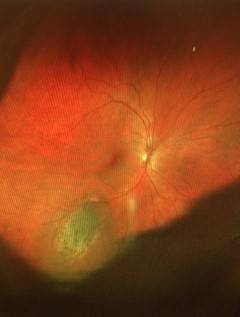
Just like in the skin, you can get a freckle (nevus) in the eye also. Most freckles are benign, though they need to be watched as they have a small chance of conversion to melanoma (cancer). The freckle can be in the white part of the eye (conjunctiva), the colored part of the eye (iris) or in the back of the eye (choroid).
Risk factors
- Most freckles are present at birth or develop in the first two decades of life
- White skin and blue eyed people are more likely to have freckles
- Approximately 6 percent of Caucasian people have a mole in the back of the eye
- Sun exposure has not been proven to be linked to eye melanoma but there is some indirect evidence to suggest it could play a role.
Screening
If you have an eye freckle your doctor will carefully examine you and will also take pictures of the eye to document the size, so it can be monitored. From then on, you may require periodic examinations ranging from every three months to annually.
Prevention
The American Cancer Society recommends wearing UV-protected sunglasses when outside in strong sunlight. Though the association of UV exposure and eye melanoma is not proven it might reduce eye melanoma risk.
Eye Melanoma
There is a small chance that nevi can convert to melanoma. As in this image:

Also melanoma can occur in an eye without the presence of a nevus. Eye melanoma’s need treatment to prevent spread of the cancer cells and to preserve vision and most of the time the treatment involves radiation treatment to the eye alone.
Have you had an eye exam lately?
Can’t remember the last time you had your eyes examined? Then it’s time to make an appointment. Learn more about UofL Physicians – Eye Specialists and schedule an appointment today.
Learn more about the protecting your vision with sunglasses by clicking here.









